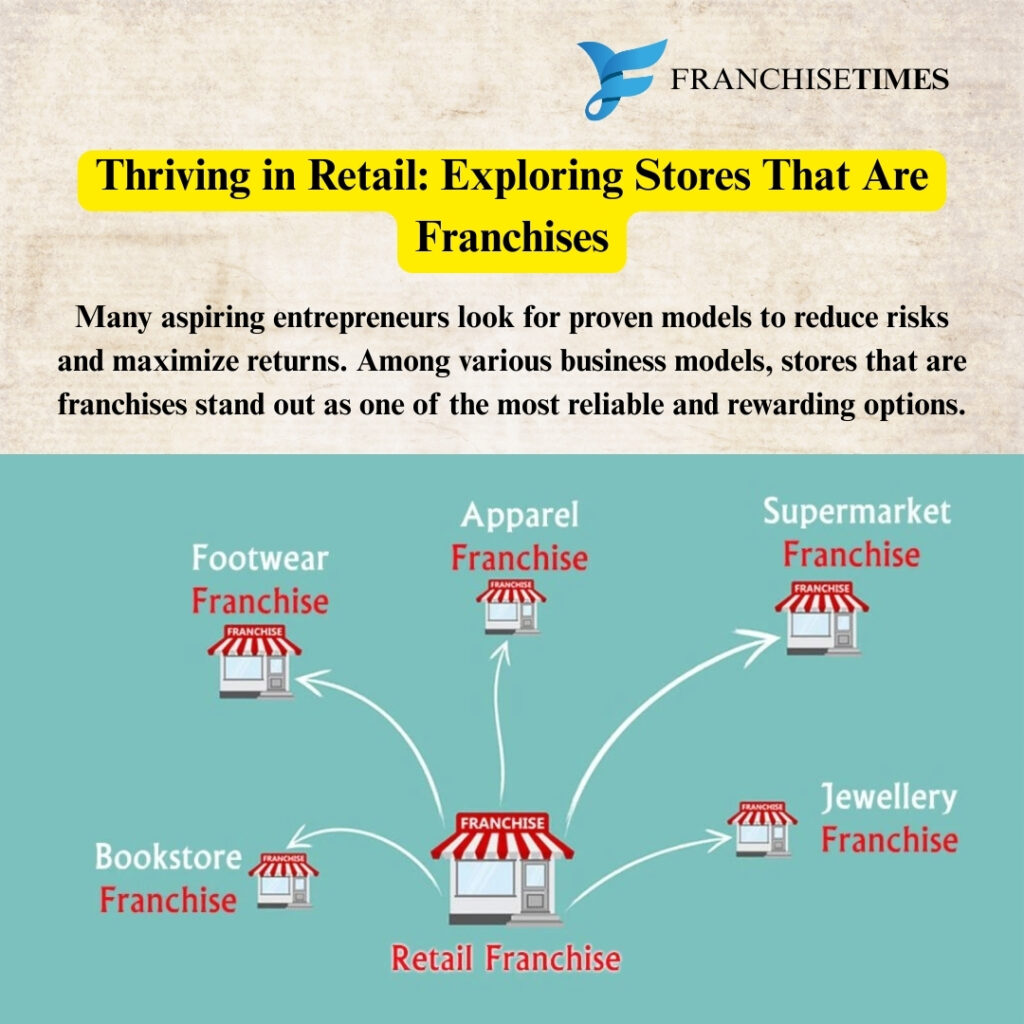Thriving in Retail: Exploring Stores That Are Franchises
In today’s competitive business world, many aspiring entrepreneurs look for proven models to reduce risks and maximize returns. Among the various business models available, Retail Franchise Business Opportunities stand out as one of the most reliable and rewarding options. These stores operate under established brand names, provide consistent customer experiences, and offer structured support systems. As a result, entrepreneurs who choose this path enjoy both independence and guidance, making franchising a balanced opportunity.

This blog explores the essence of franchise stores, their benefits, challenges, and why they remain a powerful option for business-minded individuals. By the end, you’ll have a clear understanding of how these stores operate and how they can help you succeed in the dynamic retail landscape.
The Foundation of Stores That Are Franchises
At their core, stores that are franchises are retail outlets run by independent owners but connected to a larger brand. The franchisor, which is the parent company, grants the franchisee the right to use its brand, business model, and operational systems. In return, the franchisee usually pays fees or royalties. This model creates a partnership where both parties gain: the franchisor expands its reach, while the franchisee enjoys brand recognition and established systems.
Because of this structure, these stores are not simply independent shops. Instead, they represent a carefully crafted business framework. Entrepreneurs entering this space don’t have to start from scratch. Instead, they gain access to tried-and-tested methods. This access significantly reduces the learning curve and the potential for early failure.
Furthermore, franchised stores exist across industries. From food and beverages to apparel and electronics, almost every sector has embraced franchising. This variety ensures that investors can choose opportunities that align with their interests and financial goals.
Why Franchise Stores Attract Entrepreneurs
One of the most appealing aspects of Retail Franchise Business Opportunities is their lower risk profile. Starting a business from the ground up involves developing a brand identity, creating supply chains, and building customer trust—all of which require time and resources. With a franchise store, these elements are already in place. This advantage allows entrepreneurs to focus on operations and customer service instead of trial-and-error strategies.
In addition, brand power cannot be overlooked. Consumers often trust familiar names more than new, unknown businesses. Walking into a franchise store, customers expect consistent quality and service. This expectation drives foot traffic and builds loyalty without the franchisee spending years establishing a reputation.
Training and support also make franchise stores attractive. Franchisors provide training programs, operational manuals, marketing strategies, and sometimes even staff recruitment assistance. For first-time business owners, this structured support becomes invaluable. It ensures smoother operations and equips them to handle challenges effectively.
Lastly, financial institutions often prefer lending to franchise owners. Since franchises have proven success records, banks and investors see them as safer bets compared to untested startups. This preference can make it easier for entrepreneurs to secure funding.
Challenges Faced by Franchise Store Owners
While stores that are franchises provide many advantages, they are not without challenges. The first hurdle is cost. Initial franchise fees, royalties, and marketing contributions can be significant. Entrepreneurs must carefully evaluate whether the expected returns justify these expenses. Unlike independent businesses, franchisees have less flexibility to adjust pricing or promotions since they must adhere to franchisor rules.
Another challenge lies in limited autonomy. Franchise owners follow established guidelines, which may restrict creativity. While this structure ensures brand consistency, it can frustrate entrepreneurs who wish to innovate. For instance, introducing a new product or service might require approval from the franchisor, delaying implementation.
Moreover, success depends not only on the franchisee but also on the franchisor’s reputation. If the parent brand suffers a setback, all stores under its name may face reduced trust. This interconnected risk means franchisees are vulnerable to factors beyond their direct control.
Additionally, competition among franchisees can sometimes become intense, especially if multiple outlets exist within the same area. Clear territorial rights and agreements are crucial to avoid conflicts.
Despite these challenges, many entrepreneurs consider the benefits to outweigh the drawbacks. By carefully analyzing costs, location, and brand reputation, franchise owners can navigate these obstacles successfully.
The Role of Franchise Stores in Retail Growth
Retail markets worldwide continue to evolve, and Retail Franchise Business Opportunities play a significant role in this growth. They offer consistency to customers while driving expansion for brands. Franchising allows businesses to scale rapidly without bearing the entire cost of expansion. As a result, franchisors can enter new regions and markets while relying on local franchisees’ knowledge.
This model also fosters job creation. Every franchise store employs staff, contributes to the local economy, and boosts supply chain demand. In many countries, franchising contributes billions to GDP and provides millions of jobs. The retail industry, in particular, thrives on this model because it depends on consumer trust and repeat business.
Franchise stores also adapt to changing consumer behaviors. For example, many now integrate digital payment systems, online ordering, and home delivery. These adaptations allow them to stay competitive in a fast-paced market. Because franchisors often lead innovation, franchisees benefit by staying updated without bearing the full cost of research and development.
Furthermore, franchising encourages entrepreneurship in regions where starting independent businesses may be challenging. With strong support systems, even individuals without prior retail experience can become successful business owners. This inclusivity is one reason why franchise stores remain popular worldwide.
Building a Successful Future with Franchise Stores
Entrepreneurs who wish to succeed with stores that are franchises must approach the opportunity strategically. Choosing the right brand is the first step. It’s essential to evaluate not only the popularity of the brand but also its long-term sustainability. Conducting market research helps identify whether there is sufficient demand in the chosen location.
Financial planning also plays a critical role. Franchisees should calculate initial costs, recurring fees, and expected profits carefully. Consulting financial advisors or experienced franchise owners can provide valuable insights. Being realistic about potential returns ensures smoother decision-making.
Operational efficiency is another success factor. Franchisees must follow the franchisor’s systems while maintaining high standards of customer service. Employees should be well-trained, motivated, and aligned with the brand’s values. Because customers associate the experience with the larger brand, every store must consistently deliver excellence.
Moreover, marketing efforts, both local and brand-driven, require attention. While franchisors provide national or regional campaigns, franchisees must also engage with the local community. Sponsorships, events, or local promotions can strengthen the store’s presence in the neighborhood.
Looking ahead, technology will continue shaping franchise stores. From AI-driven inventory management to personalized customer engagement, innovations will define future growth. Entrepreneurs who embrace these changes will position themselves for long-term success.
Conclusion
The world of Retail Franchise Business Opportunities blends independence with the stability of established systems. While challenges like costs and limited autonomy exist, the benefits of brand recognition, support, and reduced risk make franchising a powerful choice. Across industries, these stores drive retail growth, create jobs, and open doors for aspiring entrepreneurs.
For those looking to enter the business world with confidence, franchise stores provide a balanced opportunity. They combine the excitement of entrepreneurship with the safety net of proven models. With careful planning and commitment, entrepreneurs can thrive in this dynamic and rewarding sector.
